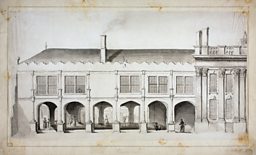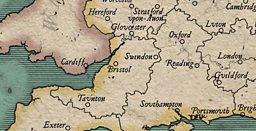Bath proves popular on Shakespeare's South-West tour
By Sally-Beth MacLean, General Editor, Records of Early English Drama
Sometime before 14 October 1597, the company of actors known as the Lord Chamberlain’s Men, likely with Shakespeare among them, followed a popular route south-west from London to Bath.
In Bath they received 20 shillings for a performance. Bristol was part of the same tour that year.
-
![]()
Much ado near me
Hear more Shakespeare stories on BBC Radio Bristol
-
![]()
Shakespeare Festival 2016
The BBC celebrates the genius of the bard

Soon after James I ascended to the throne, he assumed patronage of this acting company – one previously sponsored by George Carey, the Lord Chamberlain of the Household.

The players’ names listed in the royal patent of 19 May 1603 were as follows: Lawrence Fletcher, William Shakespeare, Richard Burbage, Augustine Phillips, John Heminges, Henry Condell, William Sly, Robert Armin, and Richard Cowley.
When the new royal troupe went on its first provincial tour the same year -- driven from London by the plague – they returned to Bath where they received the high reward of 30 shillings on 25 July for performance before the mayor and council.
No previous troupe had been rewarded at this level although Bath had been a popular stop for many of the finest professional acting companies from the mid-16th century when its civic accounts begin.
The timing of their visit suggests that they may have had in mind coinciding with Bristol’s famous St James’ Fair which ran for nine days, starting on 25 July. (Unfortunately Bristol’s civic accounts do not survive for 1603 so we have no proof that the King’s Men went a few miles further along the road to take advantage of the paying audiences there.)
By 1603 the King’s Men would have had plenty of Shakespeare’s plays to choose from when they went on the road. History plays such as Henry V would have had crowd appeal, while recent comedies such as Merry Wives of Windsor, Much Ado about Nothing, A Midsummer Night’s Dream and Twelfth Night were in the repertory. Given the location, it is likely that another play, The Fair Maid of Bristow, would have been featured. The King’s Men would choose this comedy to open their season of performances at court on 26 December later the same year.

Where in Bath were performances held?
Their performance venue in Bath was probably the medieval Guildhall, known to have existed in Boatstall Lane near the East Gate by the mid-14th c. The hall was on the ground floor with the dais for the mayor and councillors at the south end. The kitchen was located at the north end of the hall with a council chamber on the floor above beside a small armoury.
By the later 16th c. the building exterior was whitewashed and the roof tiled. In 1625 the Guildhall relocated to the market house in High Street. The old hall was converted for use as a shambles, its single gable dismantled and replaced by a double-gabled upper storey. It was subsequently demolished.

Shakespeare on Tour
From the moment they were written through to the present day, Shakespeare’s plays have continued to enthral and inspire audiences. They’ve been performed in venues big and small – including inns, private houses and emerging provincial theatres.

BBC English Regions is building a digital picture which tracks some of the many iconic moments across the country as we follow the ‘explosion’ in the performance of The Bard’s plays, from his own lifetime to recent times.
Drawing on fascinating new research from Records of Early English Drama (REED), plus the British Library's extensive collection of playbills, as well as expertise from De Montfort University and the Arts and Humanities Research Council, Shakespeare on Tour is a unique timeline of iconic moments of those performances, starting with his own troupe of actors, to highlights from more recent times. Listen out for stories on Shakespeare’s legacy on your BBC Local Radio station from Monday 21 March, 2016.
You never know - you might find evidence of Shakespeare’s footsteps close to home…
Craig Henderson, BBC English Regions
Robert Armin, member of the King's Men

-
![]()
Shakespeare Lives
The nation’s greatest performing arts institutions mark 400 years since the Bard's death
Related Links
Shakespeare on Tour: Around Bristol
-
![]()
Bristol Theatre Royal keeps it in the family
The father and son making waves in Bristol
-
![]()
Bath's trailblazing Theatre Royal
18th century tourists flock to the city for bathing, culture, and the theatre
-
![]()
Did Shakespeare visit Bristol in 1597?
Civic accounts show a high amount of performances in Bath
Shakespeare on Tour: Around the country
-
![]()
Ira Aldridge
Ira Aldridge - the first black Shakespearean actor
-
![]()
Blossoming at the Rose Theatre
Shakespeare, budding playwright and actor, at the Rose Theatre from the spring of 1592
-
![]()
Will Kemp dance finished in Norwich
Why did Will Kemp, Shakespeare's former clown, dance from London to Norwich?
-
![]()
London's Female Romeo
Charlotte Cushman, the American actress who took Victorian London by storm










